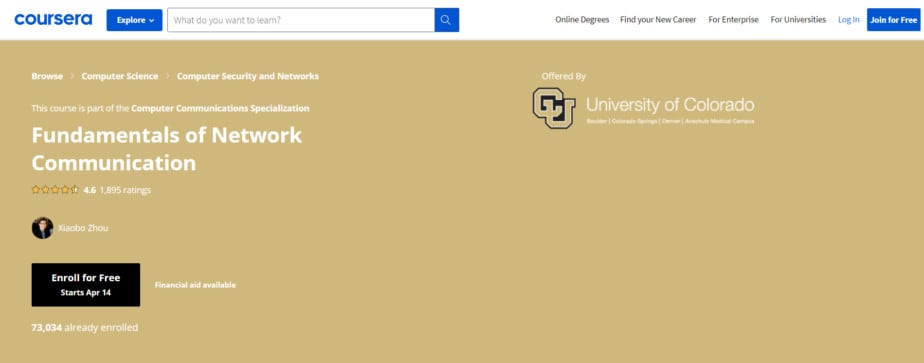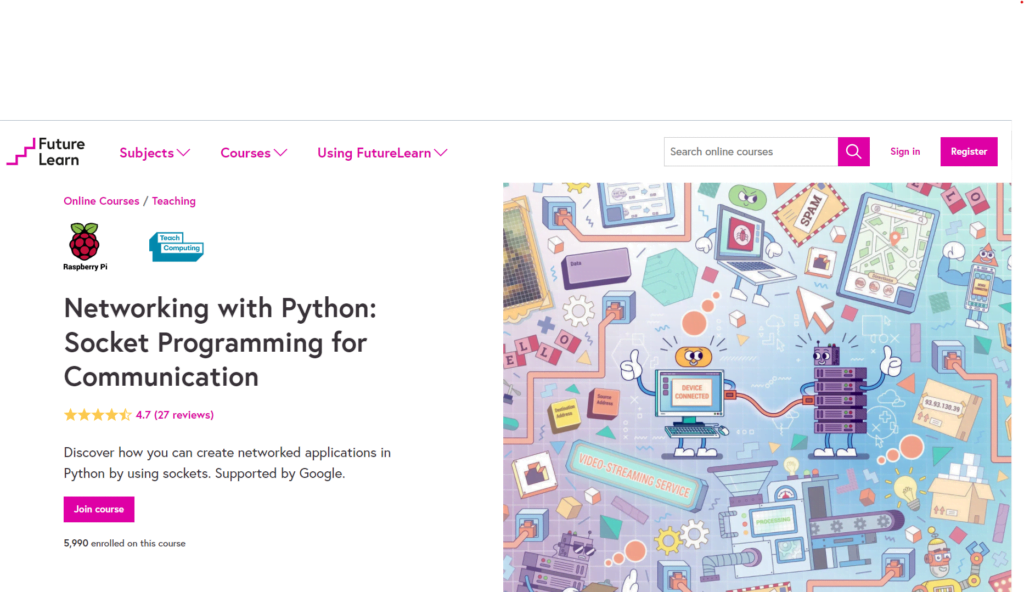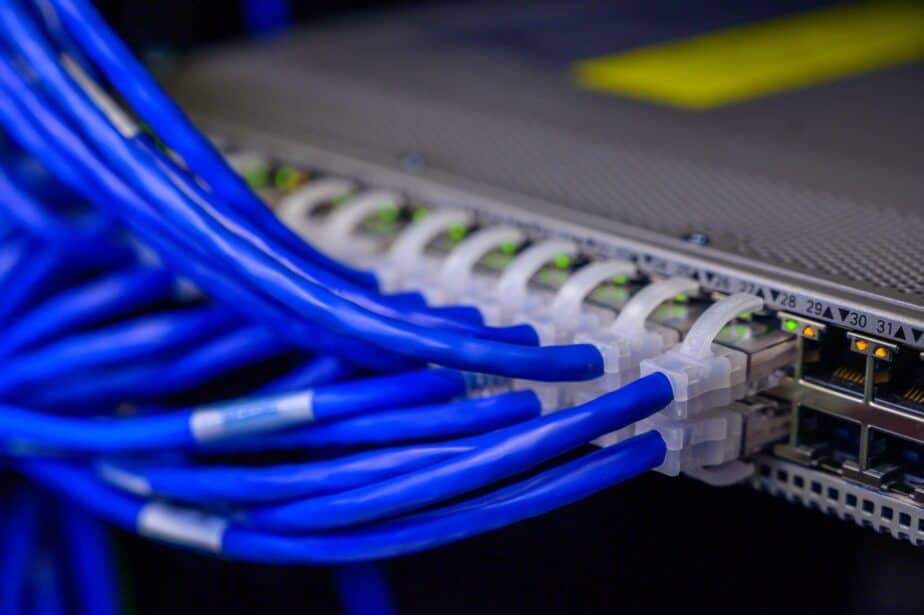Disclosure: brianvanderwaal.com is supported by our users. Some of the links in this article may be affiliate links, which can compensate me at no cost to you if you decide to make a purchase.
Choosing the wrong online networking course wastes months and hundreds of pounds. I’ve tested and compared the top network communications courses to find the best online networking courses for 2026.
Whether you’re preparing for CCNA certification or need advanced security training, this guide matches you with the right course. From free beginner options to university-backed programmes, here are my top 6 picks
Key Takeaways (TLDR)
- Discover the best online networking courses, whether you’re a beginner, job seeker, or IT professional wanting stronger computer networking skills.
- If you’re new to the field, Introduction to Networking Basics with CCNA is a beginner-friendly networking fundamentals course and provides a solid base for CCNA preparation.
- For a broad university-level introduction to network communication, Fundamentals of Network Communication is the best online computer networking course overall, with more than 132,000 learners.
- If you’re preparing for security certifications, Network and Communications Security for SSCP® delivers targeted SSCP exam prep and a strong foundation in secure network communication.
- IT professionals who need hands-on VPN training will benefit most from Securing Network Communication with Cisco VPNs, which teaches configuration, troubleshooting and real-world VPN setups.
- If you want to understand how modern networks stay secure, Communications and Network Security provides an excellent intermediate-level networking course covering encryption, secure protocols and network attacks.
- For teachers or anyone who wants practical experience building networked applications, Networking with Python: Socket Programming for Communication is the best course for learning how to use Python for real-world network communication.
- Most of the courses can be explored through free trials or limited free plans, allowing you to compare several online networking courses before committing.
What are the Best Online Networking Courses?
1. Fundamentals of Network Communication – Best Online Networking Course Overall
With a rating of 4.6/5 and 132,055 students already enrolled, it is my top pick for the best Network Communications course overall. This Network Communications course is an excellent starting point for mastering the foundational principles of Network Communication.
The Fundamentals of Network Communication course offered by The University of Colorado through Coursera teaches you about the development of networks and identifies the key concepts and functions that form the basis for layered architecture.
It is also Course 1 of 4 in the Computer Communications Specialization, which provides people with the opportunity to continue learning in this specialisation if they are interested.

In this Network Communications Course, You Will Learn About:
- Examples of protocols and services
- How these services are supported by networks
- Fundamental concepts in digital communication
- Error control techniques include parity checks, polynomial codes, and Internet checksums.
This 15-hour Course Contains Five Modules, Designed to be Completed in 5 Weeks and Includes:
1. Communication Networks and Services
- Learn about the evolution of three example networks and their associated services
- How services are influencing the evolution of modern networks
- Examples of protocols and services
- Note: If you are specifically interested in the latest evolution of mobile networks, you should explore my dedicated guide to 5G courses and training certifications.
2. Layered Architectures
- Learn about the OSI reference model
- How the overall communication process can be organised into functions that are carried out in seven layers,
- The TCP/IP architecture with a detailed routing example
3. Socket API & Digital Transmissions
- Learn about BSD sockets
- How to write applications that use the service provided by the TCP/IP protocols
- Fundamentals of digital communications
4. Error Control
- Learn about coding techniques that can be used to detect errors that may occur during digital transmission.
- Protocols that ensure the reliable transfer of information.
5. Course Project – Fundamentals of Network Communication
What I like
What I dislike
Note: Some previous programming experience in C programming (C++/Java), some fundamental knowledge of computer organisation and IT architecture and a background in computer science are a plus.
Pricing and Plans
1. Free Plan
Price: Free to audit
- The price starts from free.
- Coursera offers the option to audit this course for free.
- No certificate available in the free plan
- Choose this option to gain new knowledge.
2. Specializations
Price: $49+ per month
- The price starts from $49 per month if you want to take this course as part of the four-course specialisation.
- Choose this to master a specific skill.
- Achieve a shareable certificate.
3. Coursera Plus
Price: $239 for 12 months (regularly $399 for 12 months)
- Access this course along with 10,000+ programs
- Open up opportunities to grow your skills from beginner to advanced
- Learn from experts like Google, Adobe, IBM, and Microsoft.
- Achieve a shareable certificate.
2. Introduction to Networking Basics with CCNA – Best Introductory Network Course for Beginners
With 454 students already enrolled, Introduction to Networking Basics with CCNA is my pick for the best introductory network communications course for beginners. It’s particularly useful for those who want to start preparing for the CCNA exam.
FutureLearn offers this Network Communications Course, developed by Packt, a leading provider of learning and information services to IT professionals.
The course focuses on foundational concepts of computer networks, teaching key terminology and processes that will set you on the path to CCNA certification.

In this Computer Networking Course, You will Learn About:
- Computer networks, their operations and models
- The Transmission Control Protocol/Internet Protocol (TCP/IP) model
- The Open Systems Interconnection (OSI) model
- How routers manage data traffic and connect devices
- Local Area Networks (LANs) and Wide Area Networks (WANs)
- Internet Protocol (IP) addresses and the differences between private and public IP addresses
- Network layers, including physical, data link, network, transport, and application layers
- Binary maths and its application in networking
- Network masks and subnetting
- How to use Wireshark for network analysis
You will Gain Practical Experience Through:
- Working with Wireshark, a professional network protocol analyser tool
- Converting binary to decimal and decimal to binary for network calculations
- Assessing whether hosts are in the same network
- Exploring network details in real-world scenarios
This course takes 3 weeks at a suggested pace of 3 hours per week.
The Introduction to Networking Basics with CCNA Course Covers:
1. Computer networks and the Ethernet (Week 1)
- Defining computer networks and their applications
- Understanding bits and bytes in relation to computer networks
- Exploring the Ethernet and how it functions
- Introduction to network models
2. Network characteristics, the network layer, and routers (Week 2)
- Examining various network characteristics
- Understanding the network layer in terms of transition modes
- Learning about collisions and switched networks
- Comparing LANs and WANs within the context of network connectivity
3. IP addressing, networks, binary maths, network masks, & subnetting (Week 3)
- Identifying different types of IP addresses
- Exploring network details and IP address configurations
- Practising binary to decimal and decimal to binary conversions
- Understanding network masks
- Learning subnetting techniques
- Assessing network scalability
Prerequisites for this Online Networking Course
No prior networking experience is required. You will need access to:
- A computer running Windows or macOS
- Wireshark software (the course shows you how to download and install this free programme)
What I like
What I dislike
Note: This course provides an excellent introduction to networking and CCNA concepts. You will need additional study to fully prepare for the CCNA certification exam.
Pricing and Plans
1. Free Plan (Limited Access)
Price: Free
- Limited to 3 weeks (course can be completed within this timeframe)
- Discuss your learning in comments
- No certificate available
2. Subscribe to Unlimited
Price: £249.99 GBP or $349.99 USD per year
- Access to this course AND 1,000+ other courses
- Learn at your own pace
- Discuss your learning in the comments
- Digital certificate when you are eligible
- Automatically renews annually
3. Buy this course
Price: £39 GDP or $54 USD one-off payment
- Access to this course only
- Learn at your own pace
- Discuss your learning in comments
- Certificate when you are eligible (Printed AND Digital)
3. Network and Communications Security for SSCP – Best Network Communications Course for SSCP exam
This is my top pick for best Network Communications Course for the SSCP exam, because it is taught by the highly regarded Dr. Lyron H. Andrews, and it can easily be completed for free during the 10-day free trial.
The Network and Communications Security for SSCP® course can be completed in 1 hour and 35 minutes.

In this Network Communications Course, You Will Learn:
- How to secure your network and communication systems.
- The core concepts of network and communications
- What makes up network and communications security operations.
This Course Covers the Following Topics:
1. Certification Prep
2. Core Concepts of Network Communications (44 minutes)
- OSI to TCP IP Mapping
- Physical Layer 1
- Physical Layer 1: Wired Topology
- Physical Layer 1: Wireless Systems
- Data Link Layer 2: Systems and Protocols
- Network Layer 3: Systems and Protocols
- Transport Layer 4: Systems and Protocols
- Presentation and Session Layer 5 and 6: Systems and Protocols
- Application Layer 7: Systems and Protocols
- Summary
3. Network and Communications Security Operations (20 minutes)
- Fundamental Switch Functions
- Fundamental Router Function
- Fundamental Firewall Function
- Software Defined Network
- Supervisory Control and Data Acquisition
- Summary
4. Common Network Attacks and Countermeasures (30 minutes)
- Threats and Countermeasures Wireless
- Layer 2: Threats and Countermeasures
- Layer 3: Threats and Countermeasures
- Layer 4: Threats and Countermeasures
- Layers 5: 7 Threats and Countermeasures
- Summary
What I like
What I dislike
Pricing and Plans
1. Free Trial
Price: Free
- Try this course and other Pluralsight courses free for 10 days.
- Including skill assessments and certification prep, for free.
- Can easily complete the course during the free trial.
2. Security+ Plan
Price: $24.50/month
- Includes this course and all Security+ library courses.
- Learn the skills to keep up with tomorrow’s cybersecurity threats.
- Includes access to over 3,900 courses in the Core Tech Library, including courses in Software development, IT Operations, Product & UX, and Business skills.
- Includes skill assessments, learning paths, certification prep, and hands-on labs.
3. Complete Plan
Price: $39/month
- Includes this course and unlimited access to over 6,500 courses.
- Includes expanded course libraries: AI, data, cloud, and security.
- Build expertise across all tech domains.
- Includes access to courses in Software development, IT Operations, Product & UX, and Business skills.
- Includes skill assessments, learning paths, certification prep, and hands-on labs.
4. Securing Network Communication with Cisco VPNs – Best Network Communications Course for Securing with Cisco VPNs
This is my top pick for the best Network Communications Course on securing with Cisco VPNs, as it provides helpful training on choosing, configuring, maintaining, and troubleshooting your chosen VPN solution.
Additionally, it can be easily completed for free during the 10-day free trial. The Securing Network Communication with Cisco VPNs course can be completed in 2 hours and 57 minutes.

In this Network Communications Course, You Will Learn:
- How to choose the correct Cisco VPN solution based on your requirements
- How to configure, maintain, and troubleshoot your chosen VPN solution.
- How to configure four different site-to-site VPNs on Cisco Routers and ASAs
- How to set up a basic point-to-point IPSec VPN
- How to configure full mesh GETVPNs, DMVPNs, and FlexVPNs
- The process of configuring VPNs to protect sensitive data that may be traversing across most types of networks
- How to use relevant show commands and debugs to troubleshoot issues with your site-to-site VPN
This Network Communications Course Covers the Following Topics:
1. Course Overview
2. Configuring IPSec VPNs (36 minutes)
- A Review of IPSec VPNs
- Configuring ISAKMP Policies
- Creating IPSec Transform Sets
- Classifying Interesting Traffic with ACLs
- Binding the Components with a Crypto Map
- Setting a PSK with Tunnel Groups
- Working around NAT Issues with NAT-T
3. Implementing GETVPNs (28 minutes)
- An Overview of GETVPNs
- Creating a GETVPN Interesting Traffic Access List
- Configuring a GETVPN Key Server
- Adding Group Members to a GETVPN
- Analysing GETVPN Encrypted Packets
4. Enabling DMVPNs (27 minutes)
- A Recap of DMVPNs
- Configuring Hub GRE Tunnels and Next Hop Servers
- Configuring Spoke GRE Tunnels and Next Hop Clients
- Protecting Data with IPSec over GRE
- Avoiding Fragmentation of Tunnelled Packets
5. Configuring FlexVPNs (32 minutes)
- An Overview of FlexVPNs
- Creating IKEv2 Keyrings
- Building IKEv2 Profiles
- Configuring IPSec Profiles
- Creating Virtual Templates on Hub Routers
- Enabling Tunnel Interfaces on Spoke Routers
- Creating Virtual Templates on Spoke Routers
6. Troubleshooting Site-to-site VPNs (54 minutes)
- Troubleshooting Site-to-site VPNs (54 minutes)
- Diagnosing VPN Connection Issues with Syslog
- Utilising Common VPN Show Commands
- Making Use of Show Commands with GETVPNs
- Troubleshooting DMVPNs Using Show Commands
- Using IKEv2 Show Commands with FlexVPNs
- Debugging IPSec VPNs
- Using Debugs with GETVPNs
- Making Use of Debugs with DMVPNs
- Debugging IKEv2 and FlexVPNs
What I like
What I dislike
Note: This is an intermediate-level course and is not suitable for beginners.
Pricing and Plans
1. Free Trial
Price: Free
- Try this course and other Pluralsight courses free for 10 days.
- Including skill assessments and certification prep, for free.
- Can easily complete the course during the free trial.
2. Security+ Plan
Price: $24.50/month
- Includes this course and all Security+ library courses.
- Learn the skills to keep up with tomorrow’s cybersecurity threats.
- Includes access to over 3,900 courses in the Core Tech Library, including courses in Software development, IT Operations, Product & UX, and Business skills.
- Includes skill assessments, learning paths, certification prep, and hands-on labs.
3. Complete Plan
Price: $39/month
- Includes this course and unlimited access to over 6,500 courses.
- Includes expanded course libraries: AI, data, cloud, and security.
- Build expertise across all tech domains.
- Includes access to courses in Software development, IT Operations, Product & UX, and Business skills.
- Includes skill assessments, learning paths, certification prep, and hands-on labs.
5. Communications and Network Security – Best Online Networking Course for Managing Secure Communications
This is my top pick for the best Network Communications Course on managing secure communications, because it provides an excellent introduction to the topic and can be completed for free during the 10-day free trial.
The Communications and Network Security course can be completed in 2 hours and 58 minutes.

In this Network Communications Course, You Will Learn About:
- The practices of secure communications and network protocols, and how to engineer secure, encrypted traffic
- Internet Protocol
- Network and communications models such as OSI and TCP/IP
- Secure protocols
- Network attacks
- Network and communications security, protocols, and network encryption that are needed to help you audit, operate, and manage secure communications
This Online Networking Course covers the following topics:
1. Course Overview
2. Secure Communications Models (66 minutes)
- Open Systems Interconnect (OSI)
- TCP/IP Model
- Physical Layer Part One
- Physical Layer Part Two
- Physical Layer Part Three
- Network and Transport Layers Part One
- Network and Transport Layers Part Two
- OSI Session, Presentation, Application Layers
3. Secure Network Communications (64 minutes)
- Secure Network Communications
- Protocol Selection Part One
- Protocol Selection Part Two
- Protocol Selection Part Three
- Network Encryption Part One
- Network Encryption Part Two
- IPSec and Link Layer Encryption Part One
- IPSec and Link Layer Encryption Part Two
- QoS, CoS and Wireless
4. Network Protocols and Network Security (48 minutes)
- Network Attacks Part One
- Network Attacks Part Two
- Network Attacks Part Three
- Network Attacks Part Four
- Example of an Attack
What I like
What I dislike
Note: This is an intermediate-level course and is not suitable for beginners.
Pricing and Plans
1. Free Trial
Price: Free
- Try this course and other Pluralsight courses free for 10 days.
- Including skill assessments and certification prep, for free.
- Can easily complete the course during the free trial.
2. Security+ Plan
Price: $24.50/month
- Includes this course and all Security+ library courses.
- Learn the skills to keep up with tomorrow’s cybersecurity threats.
- Includes access to over 3,900 courses in the Core Tech Library, including courses in Software development, IT Operations, Product & UX, and Business skills.
- Includes skill assessments, learning paths, certification prep, and hands-on labs.
3. Complete Plan
Price: $39/month
- Includes this course and unlimited access to over 6,500 courses.
- Includes expanded course libraries: AI, data, cloud, and security.
- Build expertise across all tech domains.
- Includes access to courses in Software development, IT Operations, Product & UX, and Business skills.
- Includes skill assessments, learning paths, certification prep, and hands-on labs.
6. Networking with Python: Socket Programming for Communication – Best Online Computer Networking Course for Teachers
With a rating of 4.7/5 and nearly 6,818 people already enrolled, Networking with Python: Socket Programming for Communication is my pick for the best Online Computer Networking Course for teachers.
This course has been certified by the CPD Certification Service as conforming to the principles of continuing professional development.
This Network Communications Course focuses on how you can create networked applications in Python by using sockets. It is offered through FutureLearn, is supported by Google, and is designed and taught by experts from the Raspberry Pi Foundation.

In this Online Computer Networking Course, You Will Learn About:
- The principles that industry professionals use when programming for networks
- How to create programs that communicate over the internet.
- How sockets are used to abstract the complexities of the Internet.
- The layers of the TCP/IP model
- How to produce Python programs using sockets
- The life cycle of a socket
- Reliable and unreliable communication
- How to produce programs that use both TCP and UDP
- The causes of network errors
- Methods of correcting errors
You will gain practical hands-on experience through a final project where you will:
- Design and create your own protocol for a networked quiz that you will program using Python.
This course is designed to be completed in 3 weeks at a suggested pace of 2 hours per week.
The Online Computer Networking Course Covers:
1. Sockets (Week 1)
- Introduction to the course
- Networks and sockets
- Sockets and Python
- Handling two-way messaging
- Review your learning from week one
2. Dealing with lossy communications (Week 2)
- Unreliable and reliable communication
- Python and UDP
- Testing and simulating errors
- Test your understanding of network principles and review the week
3. Designing and coding protocols (Week 3)
- Protocols
- Design a networked quiz
- Coding your quiz
- Quiz royale
- Wrap up the course and see where you can go next.
As a prerequisite to this course is you will need experience in the following areas of programming:
- Using functions, including parameters and returns
- Using multiple data types
- Debugging Python programs
What I like
What I dislike
Pricing and Plans
1. Free Plan (Limited Access)
Price: Free
- Limited to 3 weeks (course can be completed within this timeframe)
- Discuss your learning in comments
- No certificate available
2. Subscribe to Unlimited
Price: £249.99 GBP or $349.99 USD per year
- Access to this course AND 1,000+ other courses
- Learn at your own pace
- Discuss your learning in comments
- Digital certificate when you are eligible
- Automatically renews annually
3. Buy this course
Price: £34 GDP or $49 USD one-off payment
- Access to this course only
- Learn at your own pace
- Discuss your learning in comments
- Certificate when you are eligible (Printed AND Digital)
Conclusion – Best Online Networking Courses
Pick the course that matches your current skill level and career ambitions. Whether you choose free CCNA preparation or invest in advanced security certification, each course in this guide delivers proven results.
Start today, and you could be network-certified within months. The skills you gain will open doors to in-demand IT careers with strong earning potential.
Frequently Asked Questions – Best Network Communications Course
What is Network Communications?
Network communication, or internetworking, defines a set of protocols (that is, rules and standards) that allow application programs to talk with each other without regard to the hardware and operating systems where they are run (Source: IBM).
Why Should I Take a Network Communications Course?
Network communications skills are foundational to how modern organisations operate. Computer Network Architects design, build, and manage the data communication networks that support everything from cloud services to cybersecurity and remote work.
According to the U.S. Bureau of Labor Statistics, employment of Computer Network Architects is projected to grow by around 12% between 2024 and 2034, which is much faster than the average for all occupations. This growth reflects ongoing demand for professionals who understand how networks are designed, secured, and scaled.
Taking a Network Communications course can help you build practical, transferable skills that are relevant across many IT roles, including networking, infrastructure, cloud computing, and systems support.
What is Network Management?
Network Management is operating, administering, monitoring, maintaining, and controlling a computer network.
What is Network Engineering?
A network engineer, also known as a network architect, maintains the connectivity of networks, including data, voice, calls, videos, and wireless network services.
They work with a company’s computer network, using information technology to develop a network architecture and network systems for everyone in a company to use.
“These information networks can include local area networks (LANs), wide area networks (WANs), intranets, and extranets.”
Network Engineers ensure all network systems are functioning properly and aim to provide the best possible infrastructure, security, and performance to the end users. Source: Field Engineer
What is Computer Networking?
Computer networking involves connecting computing devices (such as laptops, desktops, servers, smartphones, and tablets) and IoT devices (such as cameras, door locks, doorbells, refrigerators, audio/visual systems, thermostats, and various sensors), which communicate with one another.
Computer Networking encompasses the network design, building, management, maintenance, and use of a network. It ensures computer communication and mobile communication.
Computer networking enables devices to be connected on:
1. A Local area network (LAN),
2. A Wide area network (WAN)- which might connect offices, data centers, cloud applications, and cloud storage of a business or organisation together
3. Or the internet.
Source: Cisco
What is Data Communication?
Data communication is the transmission of digital data between two or more computers.
What is a Data Communication Network?
A Data communication network or computer network transmits digital data from one computer to another computer using a variety of wired and wireless communications channels.
What is the Internet?
The Internet is a huge global network, made up of smaller interconnected networks linking billions of computers, mobiles, tablets, and other electronic devices.
What is Cyber Security?
Cyber Security involves taking measures to protect and secure IT networks, systems and resources from cyberattacks. It can be a quite fun role where no two days are the same.
Cybersecurity is a broad umbrella career that includes different sub-careers and disciplines all working to ensure the integrity and safety of digital systems and networks. Learn how to get into Cyber Security.







